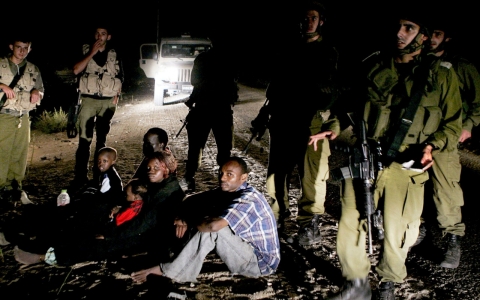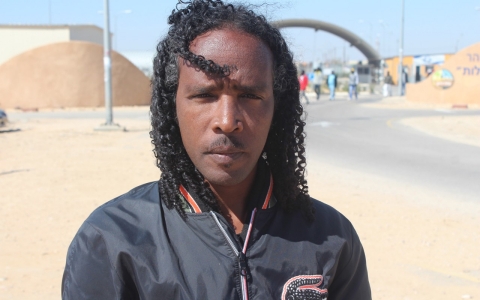Israel began releasing hundreds of African asylum seekers Tuesday from a remote detention center in southern Israel, after a Supreme Court ruling earlier this month ordered the release of those held for more than a year. But the release is bittersweet for many of 1,178 refugees and economic migrants affected by the ruling who now find themselves under pressure to find food, shelter and medical care.
Since it passed an “anti-infiltration” law in 2012, Israel has sent 1,700 asylum seekers to the Holot facility, deep in Israel's Negev desert. They are permitted to come and go, but must sign in several times a day and sleep there, making it impossible to stray far from the remote facility or hold jobs. Those who violate the rules, or reject orders to report there, can be sent to a nearby prison.
While the Supreme Court upheld the law, it ruled that migrants held at Holot for more than 12 months must be freed and overturned a provision of a law that would have allowed illegal immigrants to be held for up to 20 months without trial.
Some 50,000 African migrants are in Israel, most from the strife-ridden countries of Eritrea and Sudan. Israel says those detained are primarily economic migrants in search of work whose swelling numbers threaten the country's Jewish character.
“If we don't stop their entry, the problem that currently stands at 60,000 could grow to 600,000, and that threatens our existence as a Jewish and democratic state,” IsraeliPrime Minister Benjamin Netanyahu said in 2012.
But the migrants say they are fleeing conflict and persecution and are seeking refugee status.
“I have no place to go. I don't know anyone. I have no money. I don't know what to do,” Faysal Hussein, a 28-year-old from Sudan, told The Associated Press.
Faysal Hussein
Sudanese migrant
Fissel Sidig Adam, a 28-year-old from the war-torn Sudanese region of Darfur, said he was leaving with "64 shekels [$17] and a sandwich."
"The court decision is an important step and I appreciate it," he told AFP. "But I expected more. I expected a real solution from the state, [such as] help."
The authorities gave the asylum seekers 600 shekels a month while at Holot if they checked into the detention center each night. They were allowed to leave during the day, said Sivan Weizman, a prison service spokeswoman.
An initial 750 people were released Tuesday in small groups, and the rest will be freed Wednesday, said Weizman.
Authorities have barred those freed from entering Tel Aviv and Eilat — both epicenters of African communities with potential job prospects — in the face of hostility from many residents. Many of those leaving said they would go to other, smaller cities, where they hoped to find work, despite officially being barred from working.
As in other parts of the world, illegal migration has become a high-profile issue in Israel, with rightwing politicians calling for action to limit it and activists urging the government to accept people from countries such as Eritrea.
Citing official government statistics, Elizabeth Tsurkov, a project director at the Hotline for Migrant Workers, which is an advocacy group, said Israel has approved less than one percent of refugee requests from all countries over the past four years.
A U.N. report released in June (PDF) detailed how Eritrea, under President Isaias Afwerki's iron-fisted regime for 22 years, has created a repressive system in which people are routinely arrested on a whim, detained, tortured, killed or "disappeared.”
In a graphic video issued in April by the Islamic State in Iraq and the Levant, at least 28 African Christians were killed in Libya.
The video said the victims were Ethiopian, but three were identified as Eritreans reportedly trying to reach Europe by sea via Libya after being rejected for asylum in Israel. Their deaths have highlighted Israel's immigration policies, which rights groups say have seen thousands of African asylum seekers coerced into "voluntary" departures.
Al Jazeera and wire services

Some 2,300 people are held in a remote desert location at the open Holot detention center

Undocumented immigrants from Africa seen as 'infiltrators' threatening Israel's demographic character

African asylum seekers who find their way to Israel are denied access to services and paid to leave






Error
Sorry, your comment was not saved due to a technical problem. Please try again later or using a different browser.